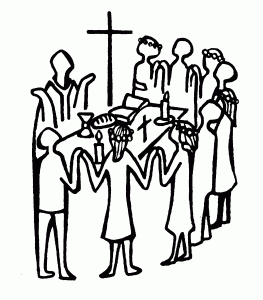One of the greatest dangers facing us as Christians is that we have received the Word of God and the Sacraments and decided that they are not enough. We need something more. It is not enough that God has made the fruits of Christ's saving death and resurrection accessible to us in His Word, His water, and His meal. We must supplement these means of grace with something more and we must redefine the mission of the Church from bringing the Good News of Christ crucified and risen to acting as the fixit people who repair whatever people decide is broken in them or their lives.
The occasion for this post is an offhand comment from a visitor who wondered how it benefited the world to schedule more opportunities for worship. According to this individual, who was very nice and not at all confrontive, the world faced many ills few of which could be helped in any way by people gathering in Church to pray, sing a few old fashioned hymns, and receive a bit of bread and wine. He was, if anything, honest -- brutally honest! Though he was not a member of my parish, he could have been. I know that there are those in the pews who secretly feel the same way. They, too, wonder about all the time and attention we spend on the Divine Service and an expensive room not often used. They also wonder about the expensive "toys" that accompany these Divine Services (vestments, Gospel book, censer, chalice, pipe organ, and the like). Why think what real good could be done if the money were not wasted on these things and instead used to alleviate suffering! Sound familiar?
Sometimes I fear that Lutherans are, at our core, just as Garrison Keillor described -- people who believe it is best to downsize and minimize. It is amazing to me that such a church could have produced the likes of a Johann Sebastian Bach -- and then I recall the battles even he had over money to support him and his family and provide the musical resources for the Divine Service. What has happened to us that we have come to view worship with such suspicion, fearing that it maybe time and resources wasted and that it could all better serve another purpose?
In the end I believe this is less about taste and preference than it is about how we view the means of grace. Do we believe the Word and Sacrament convey what they promise and deliver what they sign? Do we believe that what they bestow is the most precious gift God has to give His people? Do we believe that the means of grace are sufficient to accomplish God's purpose? I fear that underneath all the talk of how money might have better been spent is a real fear that the business of sin and grace, mercy and redemption, death and resurrection are not as important as whatever needs to be done to deal with a disappointing today. The pious at least believe we ought to be doing something good and the rest are not sure even about that (since the poor you will always have with you). But both seem to be agreed that pastors are expensive and maybe not worth the cost and churches are expensive and maybe not worth the cost and worship expensive and not worth the cost. Otherwise we would have so many battles to fight about the cost of educating our pastors, the need for simpler church buildings and services, and the guilt about spending money on Jesus that could relieve the suffering of some for a moment.
I am not, by the way, denigrating the good we ought to be doing. Mercy work is not optional but neither is it a substitute for the Divine Service and the work of worship. And if worship is done as it ought, it will lead to mercy work. But I do not know of any mercy work that birth the Divine Service. I will admit that it is not something I have studied and am making an assumption here. That said, the Church in gathered around the Word and Table of the Lord on the Lord's Day is doing what no other institution does or ever will do. We ought to remember that.
In the old days, church buildings were primarily, if not exclusively, places for the Divine Service. Now many campuses (that is what they call them) have many buildings for many other purposes and the chapel is not necessarily at the center of them. In fact, among some, the place where worship happens is either a multipurpose place or a less significant portion of the facility -- both in size and attention. My point here is to suggest that this is not without its consequences. It is as if we do truly believe that the real work of God is being done elsewhere than the Divine Service. It also questions whether or not preaching and teaching the Kingdom and administering the water of baptism, the word of absolution, and the bread and wine of the Eucharist are the uniquely established charter and purpose for the Christian Church.
Again, I am not trying to make a choice but I fear a choice has already been made. Numbers are the criteria we judge most important and faithfulness less important than results. The good that we do seems to give us more confidence that we are making a difference than the Divine Service in which Christ's Word and Supper have central place.
It is something to think about. . . and I hope that we are thinking.

1 comment:
Fantastic post - thanks for this insight, Pastor! Personally, I crave the Divine Service, because I know how quickly and easily I forget the Gospel (the Law is an ever-present millstone). I look forward to receiving the Absolution and Lord's Supper every Sunday...I need to.
Post a Comment